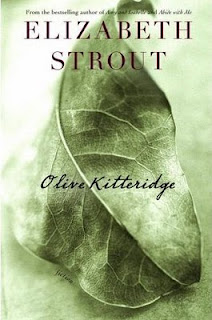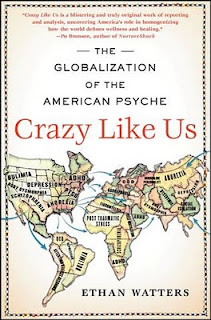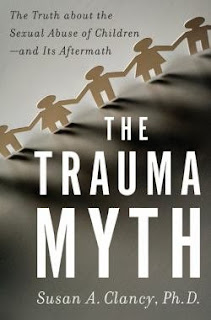Fabulous.
I'm really into the idea of this book, but I'm only partway through and I'm losing interest fast. I just have too much on my plate right now, I think.
Over and over and over again. Every night. It's awfully good - I'll give her that. But lord almighty will I be glad when it's due back at the library this weekend.
This book...this book...has been a long time coming. It says some things that really needed saying, but somehow I doubt they'll have the impact they should, which is tragic. It's very accessible, although not quite as meaty as I had hoped. Clancy recaps her grad school research on the experience of child sexual abuse as described by adult survivors. The dominant model holds that child sexual abuse is traumatic, and this trauma accounts for all the negative effects that frequently occur in the lives of abuse victims years later (such as depression). Trauma here means extreme fear, shock, violence, fear of bodily harm or death, etc rather than the more watered-down meaning it takes on in everyday conversation. So in the trauma model, one can expect the outcome of child sex abuse to be very similar to or identical with that of PTSD.
Of course, there's a political history behind this. Before child sex abuse became a form of trauma, it was widely dismissed or underestimated. Even worse, victims were often blamed and viewed as unnaturally mature and sexual, as seducers of their adult "partners" (think Lolita, here). Clancy notes that child advocates and feminists reacted strongly against this and pushed to change social views in order to get people to take child sexual abuse more seriously, procure funding for treatment and public awareness campaigns, etc. Unfortunately this went too far, and resulted in a tragic victim silencing of another sort.
It seems like there are two main forces at play in this dynamic. For one thing, those who are studying and treating victims of child sexual abuse are adults, and thus tend to understand sexual assault through an adult lens. In an adult understanding of the world, sexual assault most definitely is a traumatic experience. An adult has a much more complex understanding of sexual behavior, and a more fully developed sense of autonomy. But of course, children don't, so their immediate experience of sexual abuse is rather different from an adult understanding - and therefore experience - of it.
Second, the dominance of the PTSD model in other areas such as in the treatment of soldiers returning from war and adult survivors of sexual assault lent itself easily to the new push for protection, awareness, and treatment of sexually abused children. The PTSD train was already rolling with some pretty hardcore momentum, so it made sense at the time to hitch the child sexual abuse car to it. Except...
In the vast majority of cases, the trauma model doesn't fit. Only something like 14% of child sexual abuse cases involve violence, bodily harm, extreme fear, etc. In contrast, most are perpetrated by family members or close friends, and do not involve intercourse or penetration or physical force. The most common emotions experienced by the victims at the time are confusion and discomfort. But in our shared conceptual framework, child sexual abuse is generally the violent kind. This adds to the confusion of many victims, because they have a hard time conceptualizing it as abuse after the fact. They only hear the trauma model and are treated by therapists as if they were typical PTSD sufferers.
Thus the trauma model unintentionally adds to the victimization of survivors of child sexual abuse because they're left feeling like there is something really wrong with them because they didn't feel what they were supposed to feel. They didn't feel terrible fear or shock at the time, because they didn't really understand what was happening to them, and they weren't being physically threatened or harmed by the abuser. They didn't resist or run away, because at the time they didn't conceptualize it as abuse and had been taught to respect the authority of adults and therefore didn't see themselves as free to resist. But nobody tells them that this is actually a far more common abuse experience than the violent one sensationalized by the media and public advocacy campaigns. So it's like a double tragedy - that of being abused and having to spend the rest of your life sorting it out, and that of basically being silenced and alienated by the model we use to conceptualize the abuse and treat the victims. And I know that every word of this is true, because Susan Clancy, who has never met me, described my experience exactly.
Based on her research, Clancy advocates for a more realistic and effective approach. In the rare cases where force and violence did occur, the trauma model is fine. But in the more common case of non-violent coercion, the victims need most of all to hear that they're not alone, that many others have had the exact same experience, and that there is absolutely nothing wrong with them. This is normal. You are not fucked up, your abuser is. Your feelings and responses are totally normal, and your cooperation with something you did not understand and were not equipped to resist was totally understandable.
One would hope that in cases like this, actual interpersonal realities would trump political and economic concerns. One would hope that common sense and a desire to not silence or further victimize those who have been abused would be the driving force in the treatment of child sex abuse victims. One would hope. I'm not very hopeful. But I am very glad this book is out there.
So...I didn't really intend for this post to become a full-blown book review. It was supposed to be one of those quick li'l "this is what I'm reading what are ya'll reading" kind of posts. But the coffee's hot and the moon is full and the baby's sleeping sweetly on the couch and I just got a little carried away.
What are y'all reading these days? Anything good?




Oh wow. Wow. I had heard about the Trama Myth but I guess I mostly heard the backlash. It sounds like a lot of people have misuderstood what Clancy was saying.
ReplyDeleteI'm reading The Help by Kathryn Stockett. I'm only about halfway thru, but I highly recomend it already!
I loved Olive Kitteridge too. I hadn't heard of The Trauma Myth, but it sounds pretty commonsensical. It's hard to understand why there would be a backlash against that, unless people are afraid that we as a society won't take child abuse seriously if we don't see it as traumatizing. Interesting.
ReplyDeleteI just finished Cheap: The High Cost of Discount Culture by Ellen Ruppel Shell, and I would recommend it.
The Trauma Myth sounds like someone family and friends of sexual abuse survivors should read too. Or especially.
ReplyDeleteOne would hope that in cases like this, actual interpersonal realities would trump political and economic concerns.
ReplyDeleteYeah but...not usually. It seems like actual interpersonal realities rarely trump political and economic concerns. Hardly ever.
I read The Myth of Repressed Memory a few years ago, and it's quite different from The Trauma Myth but deals with a really hotly contested issue pertaining to child sex abuse as well. Interesting and disturbing how we handle these issues as adults.
ReplyDeleteI bet she did experience some backlash from that one. The system will not be bucked. Good on her for publishing it in spite of the backlash.
ReplyDeleteA prime example of feminist bitching and moaning. Don't you people get tired of always being the victim? Deal with it and move on already.
ReplyDeleteThere he is, right on schedule.
ReplyDeleteCommend you on bravery.
ReplyDelete